|
Kicking The Tyres
Automartindia.com
Founded: 2001
Investors: Promoters include Mahindra & Mahindra, HDFC,
and Sah & Sanghi
Initial Business Model: Online customer acquisition; offline
gratification
Current Business Model: Ditto
Revenues: Rs 125 crore (2004-05)
Net Profit: Break-even level
 |
 |
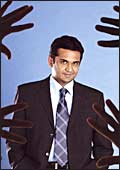 |
| As easy as ABC: (From L
to R) Automartindia's Vinay Sanghi, BharatMatrimony's Janakiraman
Murugavel and Contests2win's Alok Kejriwal |
This is one company that had it
figured out from the start if CEO Vinay Sanghi is to be believed.
"We started to roll out our outlets soon after the website
was set up," he says. Automartindia, in which auto major
M&M has a 72 per cent stake, was created to service the used
car market in the country and today boasts 65 outlets across India.
It refurbishes used cars and sells them (with warranties); some
7,000 (serious) customers trawl the site every month. "The
idea was to create an online community for used car buyers and
sellers which we've done but there was never any doubt that the
fulfillment had to be offline," says Sanghi matter of factly.
-Priya Srinivasan
Single, But Looking
BharatMatrimony.com
Founded: 1997 as sysindia.com in the US; 2000 in India
as bharatmatrimony.com
Investors: 100 per cent owned by the promoter Janakiraman
Murugavel
Initial Business Model: A portal for Indians all over the
world
Current Business Model: A match-making site with 7.5 million
members, presence in 24 countries, and a US-based magazine called
Desi Match
Revenues: Rs 45 crore
Net Profit: Not disclosed (gross profit: Rs 4.5-6.75 crore)
If J. Murugavel had had his way
back in 1997, sysindia.com would have become a community site
for non-resident Indians in the US. However, when he realised
that the most visited segment of the site was its matrimonial
listings, he quickly moved back to India and founded BharatMatrimony.
"The Indian community in the us is relatively small,"
he says. "The potential here is much larger." Apart
from serving as a simple online listing, the site also leverages
the power of the net to allow prospective matches to interact.
And its revenues come from a service charge for hosting listings.
-Venkatesha Babu
Pure Play
Contests2win.com
Founded: 1998
Investors: ICICI Venture, eVentures. In mobile content
company Mobile2Win, the investors are Softbank China and Siemens
Mobile Acceleration Fund
Initial Business Model: Hosting online contests
Current Business Model: Facilitating brand interaction
through internet, mobile and fixed line telephones
Revenues: $2.5 million (Rs 11.25 crore) in 2004-05 (expects
to close 2005-06 with $5 million, Rs 22 crore)
Net Profit: $0.7 million (Rs 3.15 crore) in 2004-05 (expects
to close 2005-06 with $1 million, Rs 4.4 crore)
Remember Indian idol, the television
talent show where viewers voted to pick a winner from the talent
on display? Well, the deluge of SMSes (some viewers voted through
messages on their mobile phones) was handled and processed by
Mobile2win, the mobile content company promoted by Contests2win.
Actually Indian Idol was different because Contests2win usually
designs the promotions that evoke a response from the consumer,
something founder Alok Kejriwal realised the company needed to
do when he first approached fast moving consumer goods major Hindustan
Lever Limited with a proposal to host its contests. We make soap,
not contests, was the response. "That's when I realised I
needed to create the contests and not just host them," says
Kejriwal whose company is now designing "adver-gaming"
for companies in India, China and Oman. "A key milestone
was the dotcom meltdown, which made us realise that we just have
to make money; we broke even that year (2001)." It might
have been baptism by fire, but it's a lesson Kejriwal won't forget
in a hurry.
-Priya Srinivasan
THE BUILDING BLOCKS
Whatever happened to all those hosting and
site-building firms?
The dotcom boom spawned a host of
companies offering services such as domain registration, website
design, maintenance and hosting. Players like Planetasia (one
of the earliest; it began operations in 1997) and Netpilgrim were
two such. However, such services turned commodities rapidly. Domain
registration and hosting became the monopoly of the cheapest service
provider. Everyone, it emerged, could build a website. Some companies
like Netpilgrim could not weather the storm and shut down operations.
Planetasia managed to completely overhaul its business model and
is a pale shadow (it has morphed into a services solutions provider
or just another code factory) of what it promised to be.
The Right Bid
eBay.in
Founded: 2000
Investors: Newscorp, ICICI Venture, Chrysalis (Now ChrysCapital),
Newbridge, Viventures. All of them sold their stake to eBay in
2004 for a total consideration of Rs 250 crore
Initial Business Model: Auction site
Current Business Model: Auction site; also provide platform
for small companies to sell products
Revenues: $100 million (gross merchandise value of Rs 460
crore in 2003-04)
Net Profit: Not disclosed
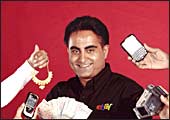 |
| Successful smiles, eh?
(From L) eBay India's Avnish Bajaj and Hungama's Neeraj Roy |
It's been nothing short of a roller-coaster
ride in terms of learnings for the Harvard Business School educated
promoters of Baazee.com (now eBay India). First, the realities
of the market simply flipped their premise-they went from being
a peer-to-peer site for used goods trading to a full-fledged b2c
model that today helps a few thousand sellers make a living. With
1.7 million registered users and 125,000 live listings, and a
solid on-ground infrastructure to back that (Baazee got courier
companies to agree to cash on delivery across 60 cities by sheer
dint of the volumes transacted), Baazee effectively ran a high
volume b2c business online. Paisa Pay, the company's online payment
gateway facility, helped too. "In Mumbai you would get access
to the latest mobile gizmo across dealers, but in a smaller city
like Indore, it would probably be available in just one store.
So buyers here get on our site and have the advantage of choosing
between at least five sellers," explains Avnish Bajaj, Chairman,
eBay India, drawing out the entire rationale behind the success
of the site. Well eBay it is and eBay it isn't.
-Priya Srinivasan
Digital DNA
Hungama.com
Founded: 1999
Investors: ICICI Venture; stake since bought back by promoters
Initial Business Model: Online advertising
Current Business Model: Using digital interface, but supplementing
that with a large physical presence in everything from advertising
to loyalty programme management.
Revenues: $4 million (Rs 17.6 crore)
Net Profit: Not disclosed
When Neeraj Roy founded hungama.com,
he wanted it to be an online advertising company that went beyond
banners. Then, a universal trend forced it into a logical diversification.
"Globally, companies were moving away from traditional advertising
into promotional marketing," says Roy. "So, we began
operating in six or seven vectors of which the net became one."
Today, the company has completed 1,000 internet campaigns and
500 mobile telephony-based ones (it diversified into that too)
for 300 brands. It managed a recent promotion for Unilever's Dove
across 12 countries; and it manages Bharat Petroleum's loyalty
programme, Petrocard, which covers two million customers. Does
Hungama qualify as an e-venture? "The DNA of the company
is digital, but we look at promotions, both online and offline,
as an integrated offering," explains Roy. That's yes and
no.
-Priya Srinivasan
WHO'S BETTER? WHO'S BEST?
Whatever happened to multinational dotcoms?
The lure of a huge market in the
making (actually, with 39 million users, it is still being made)
drew a number of international horizontal portals and search firms
to India in 2000. One of the first to set up shop was Lycos, which
entered the Indian market in February 2000; a mere 18 months later
it shut shop and sacked its entire 30-member team. AltaVista's
experience wasn't very different. Yahoo India and MSN India, however,
have survived the slump. "India has been good from Yahoo's
perspective, both for sourcing talent and as a market," says
Venkat Panchapakesan, CEO, Yahoo India Software Development. Then,
the experience of these transnational players and that of Google,
which landed much later in India (and which continues to thrive
here), reflects the fortunes of their parents rather anything
else.
Word Of Mouse
ICICIdirect.com
Founded: 2000
Investors: Incubated by ICICI Ltd (now ICICI Bank)
Initial Business Model: Net-based brokerage
Current Business Model: Ditto
Revenues: Not disclosed
Net Profit: Not disclosed
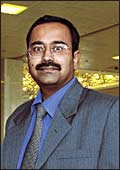 |
 |
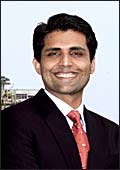 |
| The Is have it: (From L)
ICICIdirect's Anup Bagchi, Indiabulls' Sameer Gehlaut and
Indiacar's Ashwin Sanghi |
Icicidirect MD & CEO Anup Bagchi
sees the universe as one big grid. "We have about 256 grids
to fill," he says. "It's all about permutations and
combinations while servicing customers with five or six products
across four or five geographies." The company's products
include equity, derivatives, fixed income products like RBI bonds,
postal savings schemes, general and life insurance, and mutual
funds. With 350 customer sub-segments, 700,000 customers and 180,000
orders processed every day, Bagchi claims icicidirect is India's
largest online broking and financial products company. All customers
also have the option of simply picking up the phone to transact
too. As for the offline network-a no brainer, really-it's the
ICICI Bank one. Now, that's a business synergy if ever there was
one.
-Priya Srinivasan
Dot And More
Indiabulls.com
Founded: 1999
Investors: Infinity, Transatlantic, L.N. Mittal Ventures;
went for an IPO in September 2004; sold a 33-per cent stake in
Indiabulls Financial Services to Farallon
Initial Business Model: Online brokerage
Current Business Model: Online and offline brokerage, real
estate, secured and unsecured lending
Revenues: Rs 169.4 crore (2004-05)
Net Profit: Rs 56.7 crore
Was (note the tense) Indiabulls
a dotcom company? Yes, because, when it was launched in 1999,
it was positioned as a personal finance portal and an e-broking
company. The focus was on content and eyeballs, it was funded
by new economy VCs such as Infinity and L.N. Mittal Ventures,
and it was founded by three young iitians-Sameer Gehlaut, Rajiv
Rattan and Saurabh Mittal-just like several other dotcoms of the
time. Indiabulls had developed an e-trading platform and boasted
that technology was its edge. Circa 2005, the company has transformed
itself into a brick and mortar entity, harps on its branches (over
100), and has diversified into other businesses like real estate
(it picked up two mills in Mumbai for a combined value of Rs 710
crore). Today, almost half its broking revenues originate online,
but no one is likely to call it a dotcom.
-Sahad P.V.
Gone In 60 Seconds
Indiacar.com
Founded: 1999
Investors: M.K. Sanghi Group, Kotak Mahindra Bank
Initial Business Model: Aggregator of information on cars
available in the market
Current Business Model: An intermediary between the auto
dealer and customer
Revenues: Rs 7.13 crore (2004-05)
Net Profit: Rs 2.88 crore
We thought of ourselves as a purely
online aggregator of information," grins Indiacar CEO Ashwin
Sanghi, as if the very notion is laughable. Today, the company
is an intermediary with a far more lucid business model. Indiacar
provides customers with information on all cars available in the
market, aggregates demand and taps preferred dealers for substantial
discounts. In some cases, claims Sanghi, the discount could be
as high as 50 per cent. If the customer wishes to finance the
car, Indiacar takes care of that too. That's a true intermediary.
-Priya Srinivasan
 |
 |
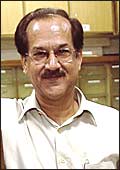 |
| Indigenous clicks: (From
L) Indiagames' Vishal Gondal, Indiamarkets' Rohan Ajila and
IRCTC's M.N. Chopra |
No Free Lunch
Indiagames.com
Founded: 1999
Investors: Infinity, IL&Fs. A majority stake was sold
to Tomonline of China in 2004. Most recent investors are Cisco
and Macromedia
Initial Business Model: Online games site with an advertising-based
revenue model
Current Business Model: Games developer
Revenues: $3-5 million (Rs 13.5-22.5 crore) as of January
2005
Net Profit: Upwards of $1.5 million (Rs 6.75 crore)
Red herring magazine (yes, it is
still around) may have just included Indiagames in its Asia 100
listing of the top private technology companies in the country,
but CEO Vishal Gondal can attribute it all to the fact that his
company is no longer a dotcom. In early 2001, he closed down the
portal that offered free games and hoped to make money from advertising.
Around the same time, he decided to work with leading studios
and handset makers to develop games for mobile phones (think Spiderman).
"We really started to see growth in the second half of 2003,"
says Gondal. "That was when mobile gaming took off internationally."
Today, more than 50 per cent of Indiagames' revenues come from
the international market. And Chinese content firm Tomonline's
acquisition of a 62 per cent stake in it (at a company valuation
of $22 million or Rs 96.8 crore) has given Indiagames the key
to the most happening mobile telephone market in the world.
-Priya Srinivasan
Smart Buying
Indiamarkets.com
Founded: 2000
Investors: Warburg Pincus and Intel Capital
Initial Business Model: B2B marketplace
Current Business Model: e-procurement service provider
Revenues: Not disclosed
Net Profit: Not disclosed
Weak supply chains, poor pricing
mechanisms, and lack of accurate information for buyers and sellers
sounds like just the setting for an online platform that can cut
the flab and bring in greater efficiences. It was with this idea
that Rohan Ajila started one of the country's earliest b2b marketplaces.
"We realised that industrial buying was not standardised,
catalogue or off-the-shelf," says Ajila. "It requires
a lot of customisation and knowledge of each industry." While
other b2b marketplaces and exchanges have gone belly up, Ajila
claims his company's vendor list of 100,000 gives it an edge (he
also says Indiamarkets is breaking even). "It is hard for
others to replicate our validated vendor base," he says.
However, it may actually be Indiamarkets' relationships with customers
such as Britannia and Marico (it has become an integral part of
their established purchase process) that has helped its cause.
-Venkatesha Babu
Online, On-track
IRCTC.co.in
Founded: 2001
Investors: Part of Indian Railways
Initial Business Model: Online ticket booking (in Delhi
online)
Current Business Model: Online ticket booking (across 160
cities including overseas ones); mobile-telephone based ticket
booking
Revenues: Rs 10 crore (2004-05)
Net Profit: Rs 90 lakh
Had Indian railways catering and
tourist corporation been just another dotcom, it would have advertised
the magnitude of its business in terms of billings. However, being
part of the government-owned Indian Railways, it neither advertises,
nor believes in billing-based calculations. For the record, IRCTC
charges users between Rs 40 and Rs 60 for tickets booked online
and its revenues of Rs 10 crore come from this (in billing terms,
the ticket value would be around Rs 225 crore, which would make
IRCTC India's biggest dotcom). Online bookings (IRCTC's charges
include delivering tickets at the desired location within the
country; overseas customers have to make do with paperless tickets),
says M.N. Chopra, Managing Director, IRCTC, have taken off largely
on the strength of word-of-mouth publicity. Today, IRCTC issues
some 7,000 tickets a day; that's a start.
-Supriya Shrinate
Online Home
Indiaproperties.com
Founded: 2000
Investors: Passion Fund (angel investor), Star TV
Initial Business Model: Listing of properties
Current Business Model: Aggregator of information on the
real estate market, but primarily still a listing site
Revenues: Not disclosed
Net Profit: Not disclosed
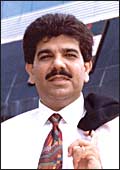 |
 |
| The i-list and the i-paper:
(From L) Indiaproperties' Naresh Malkani and Indiatimes'
Mahendra Swarup |
In an interview that awaits publication
on the site, Indiaproperties CEO Naresh Malkani makes the point
that when "our original business plan was drawn up during
1996, there was no such thing as an 'internet business'. Internet
was merely a tool. It was 'listing of properties' that was and
even today continues to be our business". True to that claim,
the site features thousands of listings in almost 200 cities across
the country and over 124,000 unique visitors from some 70 countries
visit the site every month to search for properties to rent or
buy. The listings-based business model has served the company
well. Right through the dotcom boom, one famous prognosis (there
was actually one for each sector) was that the real estate portal
would be the death of intermediaries like the broker. That has
not happened and Malkani is unlikely to be surprised by that as
he has always maintained that the listings model "does not
dispense with intermediaries like brokers; on the contrary these
listings (which are mostly provided by brokers and builders) are
their way of disseminating information".
-Priya Srinivasan
The Young Lady Of BSZ Marg
Indiatimes.com
Founded: 1999
Investors: Promoted by BCCL, publishers of The Times of
India; WestBridge and Sequoia picked up a 15 per cent stake in
the company for $36 million (Rs 158.4 crore) in 2005
Initial Business Model: Pure content company with multiple
channels on news, astrology, education, movies and the like
Current Business Model: Content-driven advertising, commerce,
auctions, ticketing & travel, hotel booking, events, and mobile
value-added services
Revenues: Rs 100 crore
Net Profit: Not disclosed
Nowhere in the world does a publishing
company directly sell white goods, hawk air tickets, or auction
hotel rooms. Bennett, Coleman & Co. Ltd (BCCL) does, albeit
through a new economy avatar, Indiatimes.com. The publisher of
the world's most read English newspaper is also one of India's
largest e-tailers and sells a variety of goods and services from
air conditioners to fridges, mobile phones to air tickets, digital
cameras to DVDs, and movie tickets to mobile ring tones. "We
are the most diversified internet company in the world,"
says Mahendra Swarup, CEO, Times Internet, who, the buzz in India
Inc. goes, is among the highest paid execs in the country. The
man is right: what began as an interactive division of a media
company has become a dotcom with a business model that could be
described as Yahoo plus Amazon plus eBay plus whatever else.
With the internet advertising model not going anywhere, Indiatimes
tweaked its business model in 2001-02, and entered the e-commerce
domain. Now it's not just a web company, but a mobile technology
(its 8888 service is arguably the most popular mobile content
one in the country) and a knowledge events one (it organises seminars
addressed by gurus such as Philip Kotler and Edward de Bono) to
boot. The WestBridge and Sequoia deal values the company at $240
million (Rs 1,056 crore). That's a bit for a dotcom.
-Sahad P.V.
 |
 |
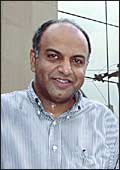 |
| Just money? Nah: (From
L) JobsAhead's Puneet Dalmia, MakeMyTrip's D. Kalra and Naukri's
Sanjeev Bikhchandani |
The Other One
JobsAhead.com
Founded: 1999
Investors: Chrysalis (now ChrysCapital) and Infinity
Initial Business Model: A youth portal with focus on eyeballs
and ad revenues
Current Business Model: A jobs site
Revenues: Rs 15 crore (2003-04)
Net Profit: Rs 6 crore
Jobsahead was one of the four channels
of a youth portal, Zipahead.com. When the founders realised that
80 per cent of the traffic was going to the jobs channel, they
decided to focus just on jobs. Says Puneet Dalmia, co-founder
of JobsAhead, "I am glad that we did it; I don't think we
would have survived otherwise." In May 2004, global e-recruiting
giant Monster.com acquired JobsAhead for Rs 40 crore. JobsAhead
is a success story for two reasons: First, from a burn rate of
Rs 80 lakh a month and zero revenues in the first two years, it
managed to rejig its business model and was returning a profit
of Rs 50 lakh on revenues of Rs 1.25 crore a month last year.
Second, after Monster bought out the company, its investors (ChrysCap
had invested Rs 10 crore for a 40 per cent stake) and the employees
did make money. Still, this was only a fraction of the Rs 300
crore tag a VC put on JobsAhead once.
-Sahad P.V.
E-tripper
MakeMyTrip.com
Founded: April 2000
Investors: In May 2005 Softbank invested $10 million (Rs
44 crore)
Initial Business Model: Inbound, outbound, domestic travel
agency
Current Business Model: Largely inbound travel agency
Revenues: Rs 12 crore (2004-05) commission revenue
Net Profit: Rs 1.25 crore
Travel, it can be said with the
benefit of hindsight, was one of those things that was bound to
succeed as an internet business. In 2000, convinced that he could
make an India-based travel agency click on the net, Deep Kalra
abandoned his upwardly mobile career at GE and founded MakeMyTrip.com.
"As opposed to a traditional model where the customer has
to depend on the ability and motivation of the travel agent, an
online model like this one immediately shifts the control away
from the travel agent to the customer," says Kalra. Still,
it hasn't always been smooth sailing for Kalra; he realised, soon
after MakeMyTrip started operations, that the Indian outbound
and domestic markets were not really net-ready. He shifted focus
to inbound tourism that today accounts for 90 per cent of the
revenues. The man is convinced that outbound and domestic tourism
will take off too and plans to use some of the money he raised
from Softbank to grow these segments.
-Supriya Shrinate
Home-grown Monster
Naukri.com
Founded: 1997
Investors: Boot-strapped for the first three years; in
April 2000, ICICI Venture invested Rs 7.3 crore for a 15 per cent
stake
Initial Business Model: Job listings
Current Business Model: Products like listing, response
management and a resume database at several price points ranging
from Rs 500 to Rs 30 lakh
Revenues: Rs 45 crore (2004-05)
Net Profit: Rs 8.4 crore
Sanjeev Bikhchandani, 42, will
be remembered in India's dotcom history as the man who built the
country's first profitable dotcom. Naukri registered revenues
of Rs 2.5 lakh in the first year, which grew to Rs 20 lakh in
the second year. "That's when we knew that we had a business,"
he recalls. Bikhchandani is the odd man among Indian dotcommers:
he runs the business conservatively and has avoided burning money
on flashy offices, high salaries, or expensive campaigns. The
result: Naukri.com is arguably India's largest e-recruitment portal
with 3.5 million registered users and 15,000 corporate clients.
And Bikhchandani is eyeing Rs 100 crore in revenues and Rs 20
crore in profits this year.
-Sahad P.V.
Online Medium?
Rediff.com
Founded: 1995
Investors: Draper International, Warburg Pincus, FIIs and
retail investors; Listed on NASDAQ
Initial Business Model: Horizontal portal
Current Business Model: Horizontal portal, subscription
based e-mail, mobile and e-commerce. Newspaper in the US targeting
Indian community (India Abroad)
Revenues: $12.6 million (Rs 56.7 crore in 2004-05)
Net Loss: $1.4 million (Rs 6.3 crore in 2004-05)
 |
 |
| Of right stuff and soul mates:
(From L) Rediff's Ajit Balakrishnan and Shaadi's Anupam
Mittal |
When Rediff started operations in
India, it boasted a business model that was part Yahoo (horizontal
portal) and part Salon (high quality journalism). The site still
continues to surprise regulars with Salon-like stories (although
less frequently than it used to) but it has, to paraphrase an
analyst's recent assessment of Yahoo's turnaround that has made
it all things to all people, become a bit of a tart. Advertising
is no longer the company's sole source of revenue; it offers a
range of services. Think value-added e-mail services. Think mobile
e-mail alerts ("You've Got Mail" beeps on your phone).
Think instant messaging. And better believe it, a print vehicle
in the US targeting the Indian community. Then there's e-commerce.
As you can see, patient reader, the point about the analyst was
well made. Still, Rediff remains, arguably, the strongest Indian
brand online. Someday, this writer hopes, it will revert to its
Salon heritage. And make money from it.
-Priya Srinivasan
Five Million Matches
Shaadi.com
Founded: 1997 (Shaadi is part of People Interactive,
which runs other verticals as well)
Investors: Promoted by Anupam Mittal and family
Initial Business Model: Matrimonial site
Current Business Model: Matrimonial site with physical
network of 'matrimonial centres'
Revenues: $10 million (Rs 44 crore, 2005-06, for parent)
Net Profit: Broke even in FY2005, expects 30 per cent net
margins from 2005-06 onwards
When Anupam Mittal, an MBA from
Boston College, founded a web development company under the name
People Interactive to develop and host dotcoms, "the idea
was eventually to have our own web properties and promote them".
Then, he met some marriage brokers, got talking to them, and got
lucky with his first web property, Shaadi.com. Today, the site
boasts five million members, People Interactive has jettisoned
its web development business, and Mittal has moved offline with
Shaadi Points, branded match-making centres, targeted at, as he
explains, "parents of people looking for life partners since
in India parents are still very much involved in the process and
most of them do not operate the net". The company has 50
such points of presence across the country and expects to have
at least 500 in place soon. People Interactive's other forays
include Fropper.com, a networking site and Astrolife.com, which
is still work in progress. Who says dotcoms are dead?
-Priya Srinivasan
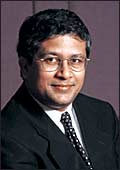 |
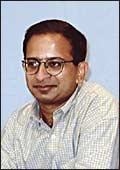 |
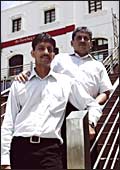 |
| Ssstill there: (From L)
Sify's Zacharias, Sulekha's Prabhakar and Sharekhan's Arora
(front) and CEO Tarun Shah |
India's AOL
Sify.com
Founded: 1998
Investors: Promoted by Satyam. Raised $80 million in 1999
and $140 million in 2000. Listed on Nasdaq
Initial Business Model: ISP, portal, B2B and B2C commerce,
eLearning , corporate services, cybercafes
Current Business Model: ISP (corporate services largely,
and hosting and internet telephony), cyber cafes, and portal
Revenues: Rs 360 crore (2004-05)
Net Loss: Rs 30 crore
At its prime, the Nasdaq-listed
Sify was valued at $10 billion (Rs 44,000 crore). The company
was India's AOL and Yahoo rolled into one. The retail ISP business,
however, became a commodity-play, B2B and B2C commerce never really
took off in India, and in 2001, Sify recorded losses of Rs 130
crore. "We realised that we spread overselves too thin, but
back in 1998-2000, anything seemed possible," says George
Zacharias, President and coo, Sify. "We re-oriented ourselves
quickly." That re-orientation is along three dimensions:
corporate services from which it derives nearly 50 per cent revenues,
cyber cafes (25 per cent of revenues from some 2,800 cyber cafes),
and dial-up access and other services (rest). This decade, some
analysts reckon, could well be Sify's.
-Venkatesha Babu
Good Writing
Sulekha.com
Founded: 1998
Investors: Angel investors (Rs 18 crore)
Initial Business Model: Mailing list for alumni of IIM,
Calcutta
Current Business Model: Encourages people to write. Site
earns income through sale and syndication of content. Also earns
money through transaction services, such as online ticketing for
organisations and companies, and classifieds.
Revenues: $5.85 million (Rs 25.7 crore)
Net Profit: 20 per cent margins (Rs 5 crore, BT estimates)
The idea of Sulekha originated
from an e-mail list, unpretentiously named Dakghar (post office
in Hindi) that connected the alumni of the Indian Institute of
Management, Calcutta. The list used to carry articles and essays
written by the alumni. One alum, Satya Prabhkar, was inspired
by the idea. He and his wife created a website in 1998 to publish
articles written by Indians from around the world. Today, the
site gets 20 million page views every month. Pengiun has even
published books on select articles from Sulekha called Sulekha
Select and Black, White and Various shades of Brown. The company
earns money from classifieds, syndication of content, advertising,
and ticketing (for Indian movies and events in the us). Who says
there is no money in writing?
-Venkatesha Babu
Paperless Tiger
Sharekhan.com
Founded: 2000
Investors: Sripal Morakhia (SSKI) & Fly, HSBC, Carlyle,
Intel
Initial Business Model: Online brokerage
Current Business Model: Online-offline brokerage
Revenues: Rs 100 crore
Net Profit: Not disclosed
A year after its launch, Sharekhan
had to cope with the double-whammy of the dotcom bust and a stock
market scam. It was then that the company took some firm decisions
such as opting for an offline presence. Over the last three years,
the company has expanded its presence to about 300 outlets across
130 cities and offers products such as equity, equity derivatives,
commodities, and, soon, mutual funds. Sharekhan has 130,000 broking
customers, and adds 7,000-8,000 every month. "This whole
business model goes with technology," says Jaideep Arora,
the director in charge of online business at Sharekhan. "The
online business represents 10 per cent of the overall business
on an exchange like the NSE (National Stock Exchange of India).
In the us that is about 35 per cent," he adds bullishly.
Or should that read tigerishly?
-Priya Srinivasan
Banking On Travel
Traveljini.com
Founded: 2000
Investors: ICICI Venture, Rediff
Initial Business Model: B2C travel portal
Current Business Model: B2C travel portal, booking engine,
complete holiday packages, travel loans and corporate events
Revenues: Rs 4.5 crore
Net Profit: Not disclosed (3-5 per cent net margin)
 |
 |
| Travelling angel and 'Your'
man: (From L) ICICI Venture's Renuka Ramnath and YourManInIndia's
P. Sundar |
Traveljini was always clear about
one thing: the site would have an online booking engine, everything
else would be built around that. So with ICICI as the payment
gateway (it helps that ICICI Venture is an investor) the company
has been carrying out online booking for leisure travel (which
is what they specialise in) since 2001. Of the site's 145,000
registered users, about 10 per cent have availed of the online
booking facility and in the next two-three years, Vijay Fernandes,
Vice President, Traveljini, expects another 15-10 per cent to
do so. Meanwhile offline activities like organising corporate
events, conferences and meetings keep the cash register ringing.
-Priya Srinivasan
A Country Of Parents
YourManInIndia.com
Founded: 2000
Investors: Promoted by the TTK Group
Initial Business Model: Healthcare facilities to India
resident relatives of NRIs
Current Business Model: A host of services for NRIs, including
sourcing certificates and documents, delivering gifts, and doing
background checks on prospective spouses, to something as esoteric
as arranging priests for a marriage
Revenues: Rs 2.5 crore (BT estimates)
Net Profit: Rs 1.25 crore-Rs 1.5 crore (BT estimates)
To people south of the Vindhyas,
TTK is a name synonymous with trust and longevity (the group makes
the Prestige brand of pressure cookers that last for at least
a generation). The story goes that when some of TTK Prestige's
executives were travelling in the us to promote their products
(in case you hadn't noticed, dear reader, the Valley is crowded
with it-types from Tamil Nadu, Andhra Pradesh and Karnataka),
they came across Indians struggling to cope with the healthcare
needs of elderly relatives back home. Thus was born ttkbharatplanet.com,
which later morphed into YourManInIndia, but as coo P. Sundar
says, "There were problems like health insurance being largely
a public sector domain and lack of national chain of hospitals."
In December 2003, the company refocussed itself as a local contact
for NRIs, an entity that could liaise with local administrative
bodies for documentation, handle divorces and civil disputes,
even deliver gifts. Now, buoyed by the site's success, Sundar
is considering venturing into China and the US (getfriday.com,
which says it can get tickets for the big Chicago Bulls game,
for instance, is just up).
-Venkatesha Babu
|

























